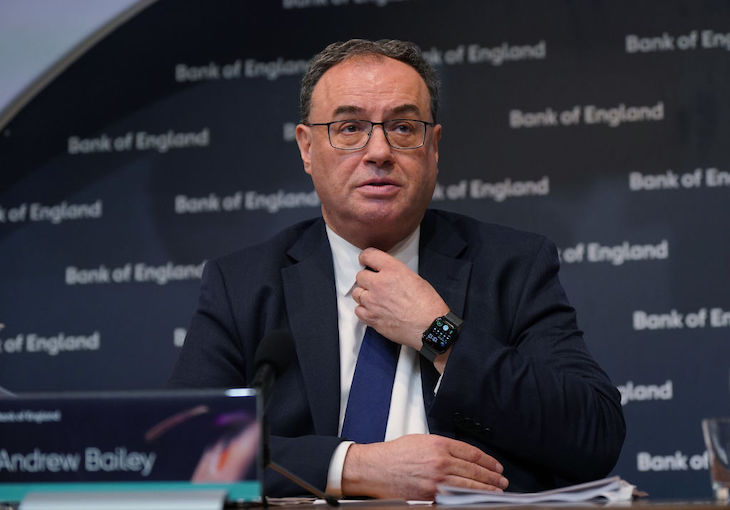There was no easy option for the Bank of England’s Monetary Policy Committee (MPC) this week. Raising interest rates, even by a small amount, could add to financial instability following the collapse of Silicon Valley Bank and takeover of Credit Suisse over the past few weeks. But holding the base rate at 4 per cent might lead to accusations of ignoring double-digit inflation, which rose on the year in February for the first time since the Consumer Prices Index (CPI) peaked last October.
Today, the MPC opted for the latter – voting 7-2 in favour of raising the base rate by 0.25 percentage points, from 4 per cent to 4.25 per cent. It’s the eleventh consecutive hike since the UK emerged from a period of ultra-low interest rates during the pandemic. But the rise is less aggressive than the increases seen in previous months. Two members who voted against the rise voted to keep rates at 4 per cent.
The hike follows the Federal Reserve, which voted to raise rates in the US by 0.25 per cent earlier this week. It also follows the market consensus, which was expecting a 25 basis point rise, and still expects rates to rise slightly further, peaking around 4.5 per cent.
In response to concerns about what higher rates might mean for financial stability, especially within the banking sector, the MPC’s minutes note that the Financial Policy Committee (FPC) briefed them ahead of their vote. Their verdict was that the ‘UK banking system maintains robust capital and strong liquidity positions,’ and ‘that the UK banking system remains resilient.’ But despite this confidence, nothing is being taken for granted: the MPC pledges to ‘monitor closely any effects on the credit conditions faced by households and businesses, and hence the impact on the macroeconomic and inflation outlook.’
The committee decided, on balance, that inflation remained the more immediate problem. It’s a position that has changed over the past six weeks: consensus was building last month that interest rates were near, or at, their peak. With inflation falling (albeit slowly) for three months in a row, it seemed the Bank of England was finally in a position to take its foot off the gas. In its MPC report on 2 February, it noted that rates would only keep rising if ‘persistent pressures’ became obvious.
The Bank of England remains surprisingly optimistic about its forecasts for inflation this year
Those pressures became glaringly apparent this week, when the headline rate of inflation rose for the first time in three months, to 10.4 per cent on the year in February. Last month’s forecast from the Bank of England estimated the rate falling to 9.8 per cent in February, 0.6 percentage point lower than where it landed. Core inflation rose, too – from 5.8 per cent on the year in January to 6.2 per cent on the year in February – raising worries that higher prices might get baked into the system.
The Bank remains surprisingly optimistic about its forecasts for inflation this year. It still predicts that the rate will fall dramatically by the end of the year – to an even ‘lower rate than anticipated in the February’, which was 3.9 per cent, largely due to the collapse of energy prices. The Bank has also revised its forecasts for economic growth to the upside, and for now no longer expects the UK to enter technical recession this year.
But the MPC had no option available to them today that could swerve criticism. In what might be read as a pre-emptive defence of the Bank’s decision to keep raising rates in the wake of a potential global banking crisis, the MPC report reminds its readers of its core remit, which ‘is clear that the inflation target applies at all times.’ As the Bank remains so far off the 2 per cent target, this had to be the MPC’s main focus.
But there is also a reputational aspect of today’s vote to consider. Rightly or wrongly, last year’s Liability Driven Investment (LDI) pensions crisis saw the government at the time labelled the culprit, while the Bank was praised for its fast intervention to steady the market. That narrative doesn’t consider the Bank’s regulatory duties, nor the fact that such a huge financial landmine sat under the UK economy which seemingly no one at the Bank knew about.
For now, the Bank is not taking a beating over its handling of last year’s crisis. Its negotiated deal with HSBC to buy the UK arm of Silicon Valley Bank has also been applauded. Instead, the Bank remains in hot water for being so relaxed when faced with the inflation tiger in 2021 – which has meant it is trying to play catch-up in a bid to tame the beast. With the headline rate up once again last month, the MPC must continue to prove they take price spirals seriously, by taking some action (albeit a smaller rate hike this time) to get inflation under control.







Comments